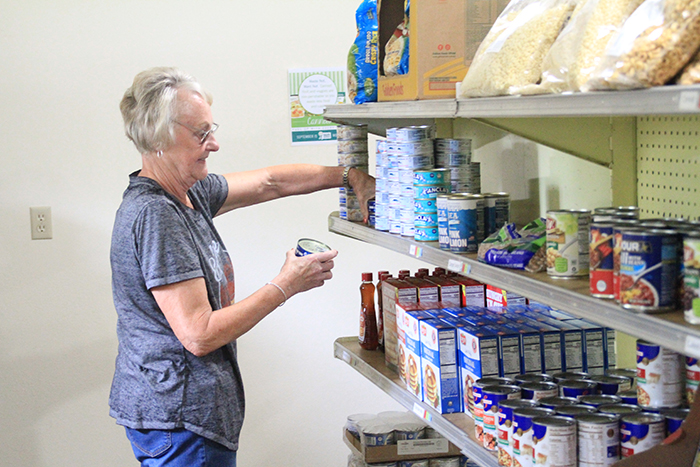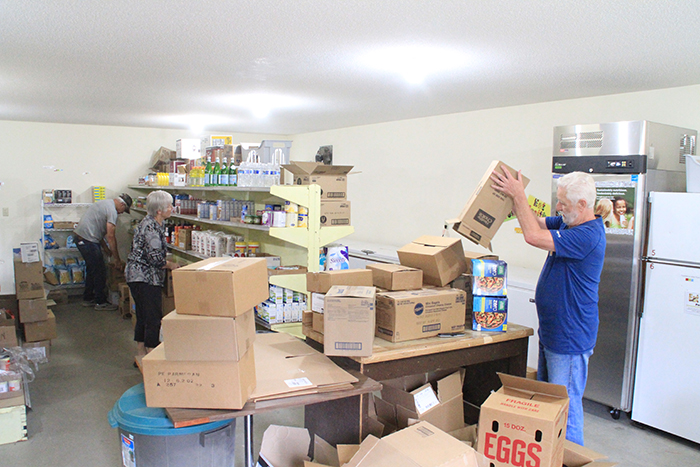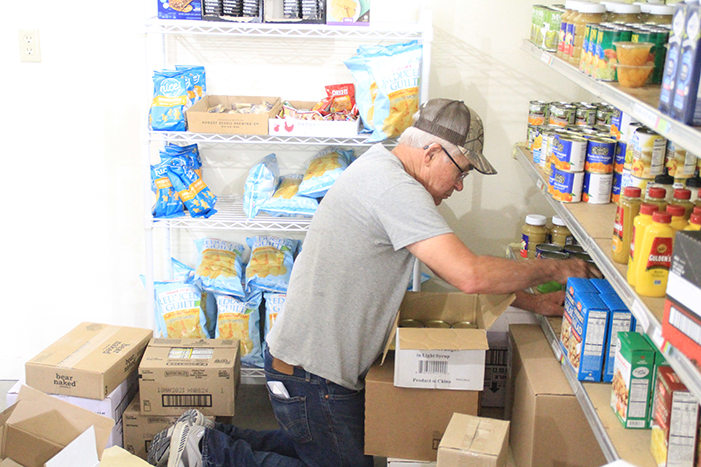Expanding a reach at NYM Food Shelf
News | Published on June 20, 2023 at 3:13pm GMT+0000 | Author: Tucker Henderson
0Pilot program to extend hours at local food shelf

Jerilyn Jacobson helped to stock the New York Mills Food Shelf aisles on delivery day last week. The food shelf will be unveiling a pilot program this summer and offer an additional time once a month to visit the establishment.
By Tucker Henderson
Reporter
With an ever-changing economy, long work hours, and the possibility of unknown financial difficulties always looming around the corner, some families need a little more support to keep them afloat.

This fact remains true in small-town Minnesota and combatting hunger has been the mission of the New York Mills Food Shelf for over 30 years.
“People can visit the Food Shelf one time a month,” said board member and volunteer Teresa Muckala. “We know it only takes one event—whether it’s a trip to the emergency room or somebody needs a car repair—all of the sudden their budget is broken. Especially with some people not earning a lot of money.

“We’re open on the last Monday of every month from 9 a.m. to noon and it’s during that time that we’re serving a family every seven minutes,” Muckala continued. “We have quite a few people that use the Food Shelf and they can be folks who are on fixed incomes or they might be people who have children and the income just does not match what they need for groceries.”
The food shelf is adding an additional two hours each distribution day from 4:30-6:30 p.m. as a pilot program for those who might not be able to utilized the regularly scheduled hours.
“Now we’re adding this second time on that same day,” said Muckala. “We don’t know how much use there will be for the food shelf for these extended hours, it’s a test. We’re going to run from now until January and see if people come, if they feel they need this late-afternoon time of day to pick up. We’re doing it in case there are families that we can give this sort of assistance that need it.”
The food shelf is there for those who are in difficult financial situations where they have to decide between paying for vehicle repairs, hospital bills, new housing, purchasing groceries, and other essential needs. In 2022, the food shelf served 316 families and 717 individuals. They distributed 34,000 pounds of food as a supplementary food resource.
“We want to make the grocery choice a little easier,” said Muckala. “We want people to know that we are adding more hours.”
Mills Country Market has supplied their aid to the cause and accepts vouchers from the food shelf for those who need fresh produce, milk, and eggs, which the food shelf is not always able to stock and have on hand.
“(They) have been truly wonderful,” said Muckala of Mills Market’s assistance.
The food shelf began in 1992 and for over 30 years has run as a totally volunteer organization.
“We have about 16 volunteers who are here for distribution, others are here when we take deliveries,” said Muckala. “Then we have a board of nine people and they set policy. For instance, for the very first time, we had youngsters who wanted to volunteer and we had to set a policy before that could happen. People who are under the age of 18 do not work on distribution days, because we don’t want to put the burden of confidentiality on kids. That’s a burden adults can carry. Instead, they can come on delivery day and put away groceries.”
These volunteers help move, stack, and face food items on the shelves of the food shelf each month when the North Country Food Bank truck arrives bearing their monthly delivery. Teresa and her husband, John Senglaub, order the needed food each month.
“We pay close attention to what is very inexpensive,” she said. “Some of the foods come from the Department of Agriculture and in that case, some of the meat has no cost, except we pay for the shipping weight.”
“A lot of the foods might not seem like a staple, like banana muffin mix or marshmallows, but it is when it’s three dollars for the case,” Muckala continued. “Parent’s have kids at home and if they’re helping their kids learn how to bake or they’re just providing a dessert, that’s a wonderful thing.”
Muckala’s reason for volunteering comes from the lessons she learned during childhood.
“If you go back to thinking about the lessons we were taught as children, one of them was ‘love your neighbor as yourself,’” said Muckala. “That’s really what this is all about. It’s an opportunity to live that.”

